Choosing the Right Bird Babysitter: A Guide
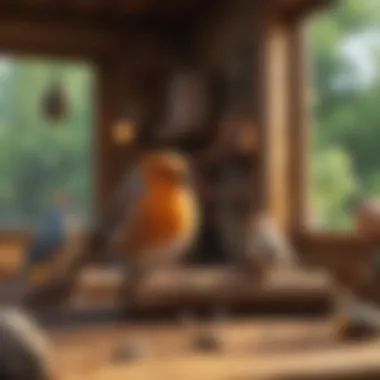
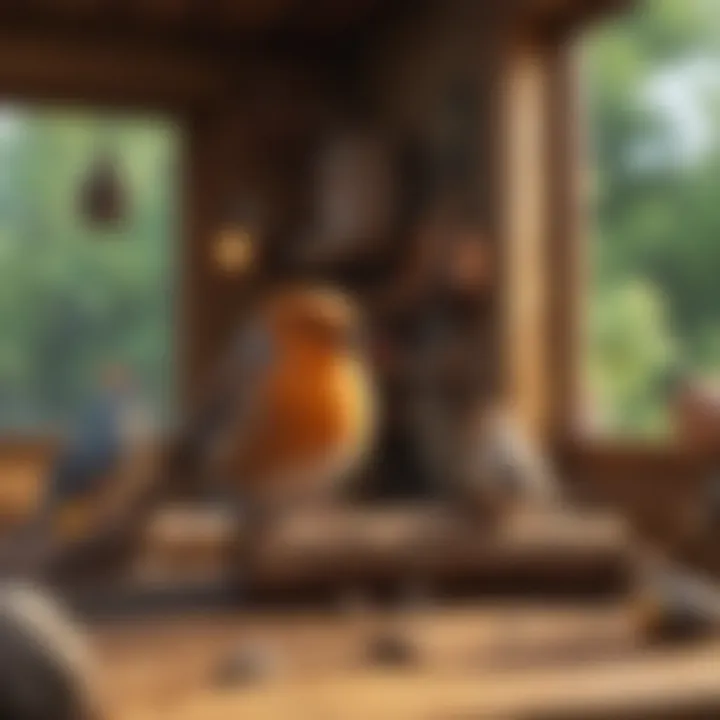
Intro
When you think about pets, birds often don't immediately come to mind as furry companions. However, they bring their own unique charm and personality to the table. Just like with any pet, when you're off on your next adventure, having a reliable caretaker for your feathered friend becomes paramount.
This article will guide you through the ins and outs of finding a dependable bird babysitter in your area, emphasizing the critical qualities to look for. It dives into the specific needs of different bird species, care considerations, and options available locally. With that said, let's take a closer look at what makes your pet's well-being essential and how to ensure they are well cared for in your absence.
Understanding Your Pet
Pet Behavior Basics
Birds, while delightful creatures, exhibit behaviors that differ greatly from mammals. Observing your bird's routines and habits is a critical step for any bird owner. Whether your pet parakeet has a penchant for singing its little heart out or your cockatoo loves to chatter away, understanding these behaviors can significantly influence how you choose a babysitter.
Birds are social animals. They often thrive on interaction, which means that a suitable caregiver should be someone who appreciates these traits and is willing to engage with your pet.
Common Breed Characteristics
Each bird breed carries unique nuances. For instance, a budgie's playful nature contrasts sharply with a more reserved African Grey. This difference can affect personalities, care requirements, and thus, the kind of babysitter you should be seeking.
- Budgies: Energetic and sociable, they love to play and interact.
- Cockatiels: Known for their affectionate nature, they often enjoy gentle petting and companionship.
- Lovebirds: Highly social, these birds require plenty of interaction to prevent loneliness.
- African Greys: Intelligent but can be more reserved, they may prefer quiet environments.
Understanding these traits ensures that you find a sitter who matches your bird's specific personality.
Species-Specific Needs
Birds can range from small, low-maintenance types to larger species requiring more dedicated care. It’s vital that your caregiver knows how to accommodate these needs. Do they understand the importance of mental stimulation through toys for a conure or the proper temperature for a parrot? These specifics distinguish a passable sitter from an exceptional one.
Pet Care and Maintenance
Feeding Guidelines
Just like humans, birds have dietary requirements that are foundational to their health. A well-rounded diet not only keeps them fit but can also affect their mood and behavior. Here are a few things to consider:
- Fresh fruits and vegetables should be a daily part of their diet, alongside high-quality pellets.
- Seeds should be offered sparingly, as they can be high in fat and lacking essential nutrients.
A caring bird babysitter should adhere to your specific feeding schedule and know how to prepare meals suitable for your feathered friend.
Grooming Essentials
Grooming your bird may not be on the top of your list, but it should be! Regular nail trimming and occasional baths can keep them comfortable and happy. A good sitter should recognize the grooming needs of various breeds, and if necessary, consult a professional groomer.
Hygiene Practices
Birds can be quite messy. A regular cleaning routine of their cage and toys is essential for health. Your caregivers should understand the importance of sanitation and be willing to keep those living areas spick and span.
Training and Development
Basic Commands and Skills
Instilling basic commands like “step up” can facilitate better communication between your bird and its caretaker. A knowledgeable sitter should be adept not only in following these established commands but also in reinforcing positive behaviors.
Behavioral Training Techniques
Some sitters may use varied techniques to train or engage with your bird. Knowledge in behavioral training can ensure that your pet remains well-behaved, minimizing any stress for both parties.
Addressing Common Behavior Issues
Just like any pet, birds can exhibit undesirable behaviors if left unattended. An ideal caregiver should know how to handle common issues like excessive screaming or biting through positive reinforcement techniques.
Health and Wellness
Routine Vet Check-ups
Periodic visits to a vet specializing in avian care should not be overlooked. It’s critical that your caretaker can recognize when a bird may need a visit to the vet while you are away.
Vaccination Needs
Birds have specific vaccination schedules, and a dependable sitter should know if your pet is up to date on necessary shots.
Recognizing Signs of Illness
Not all illnesses are easily recognizable. A good sitter should be familiar with signs such as fluffed feathers, lethargy, or changes in eating habits — all red flags that your bird may be unwell.
Enrichment and Activities
Indoor vs. Outdoor Activities
Understanding the fine line between indoor play and outdoor exploration is vital for your pet bird's happiness. Many birds thrive in an enriched environment. Caregivers should consider supervised time outside versus fun indoor games that engage your equipment and toys.
Interactive Toys and Games
Providing stimulating activities keeps your bird entertained and mentally fit. A good babysitter will know how to rotate toys and introduce engaging games to stimulate your pet.
Socialization Opportunities
Finally, birds are social creatures, often needing interaction not just with other birds but also humans. Your caregiver should know how to facilitate socialization opportunities to keep your feathered friend from feeling isolated.
In summary, choosing the right bird babysitter requires careful consideration of the unique needs of your feathered friend, ensuring that these elements are accounted in your decision. With the right guidance, you can rest easy while knowing your precious pet is in great hands.
"A bird in the hand is worth two in the bush." Take the time to find a babysitter who will treat your pet as their own.
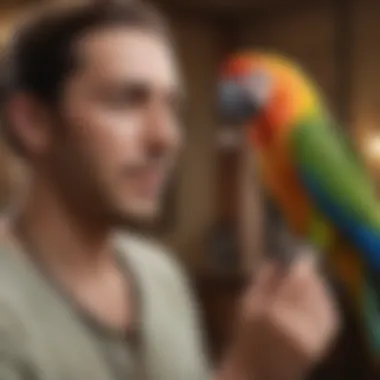
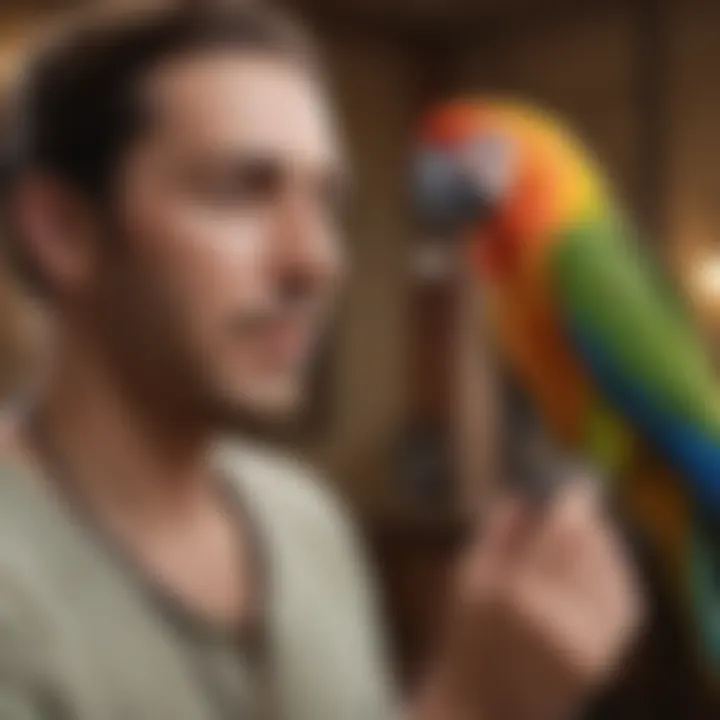
Understanding Bird Babysitting
Bird babysitting is a topic that often flies under the radar for many pet owners. Understanding the nuances involved in finding a suitable caregiver for one's feathered friends is key. Birds are unique creatures, often requiring specialized care, and when the need arises to find a bird sitter, there are specific considerations to keep in mind.
This article aims to give pet owners clarity and confidence as they navigate the bird babysitting landscape. It's not just about finding someone who can feed or cage a bird; it's about ensuring that the caregiver understands the individual needs that come from different bird species and personalities. Moreover, it’s about building a bond of trust, so that both the pet and the owner can feel at ease during their time apart.
The Role of a Bird Babysitter
A bird babysitter is not merely a landlord for your pet, but rather a companion who helps maintain the well-being of a cherished member of the family. The role encompasses several aspects:
- Companionship and Interaction: Unlike cats or dogs, birds thrive on social interaction. A good babysitter will engage the bird in activities that stimulate its mind and ensure it feels connected during the owner's absence.
- Routine Maintenance: Birds often have specific habits and routines, from feeding to playtime. A caregiver must be willing and able to follow these routines to provide comfort for the bird.
- Health Monitoring: It's essential that the babysitter stays alert to any signs of distress or health changes. Birds can be remarkably good at hiding discomfort, so having a sitter familiar with normal behaviors is crucial.
Why Bird Sitters are Necessary
Having a bird babysitter might come across as an excess, but for many pet owners, it’s a necessity. Here are some reasons that highlight the importance of finding a reliable caregiver:
- Peace of Mind for Owners: The ability to leave home without worrying about the bird’s well-being helps the owner focus on the task at hand, be it work or leisure.
- Prevention of Stress for Birds: Birds can become anxious if left alone for extended periods. A caregiver can provide the needed interaction and care to minimize this stress.
- Emergency Response Capability: Should any unexpected situations arise, a well-informed bird sitter can act swiftly, potentially protecting your bird's health and safety.
By recognizing the key elements associated with developing an understanding of bird babysitting, owners can make informed decisions. Using the right resources, finding a suitable bird sitter, and establishing clear lines of communication can turn a daunting experience into a smooth one, ensuring that both the bird and the owner are well cared for.
Local Search for Bird Babysitters
When it comes to finding a suitable bird babysitter, local options often yield the best results for both pet owners and those providing care. Relying on nearby resources can help ensure that your feathered friend receives the attention and care they need. The importance of focusing on local options can’t be overstated. Local sitters usually understand the unique needs of birds native to the area, can offer flexibility in scheduling, and provide a sense of familiarity for your pet. Engaging someone within your community can also help create a relationship built on trust and reliability.
Searching locally allows for personalized interactions, and establishing a rapport is crucial when it comes to caring for birds. Birds are sensitive creatures, and introducing them to a new environment can be stressful. By utilizing local search methods, potential caretakers can meet your bird before any babysitting occurs, easing the transition for both parties. Furthermore, considering a transportation aspect, local sitters can be more readily available for any emergency situations that may arise.
Using Online Platforms
In today’s digital age, harnessing online platforms is often the first step in the search for bird sitters. Websites or applications, like Care.com or Rover, allow users to filter based on proximity, availability, and specific needs of their pets. These tools are quite handy, as they let potential pet sitters showcase their credentials and experience through profiles that often feature reviews from previous clients.
When using online platforms, you can usually expect to find:
- Profiles that include the sitter’s background and experience with birds
- Reviews from other pet owners that can shed light on how the sitter interacts with pets
- Scheduling options that can make coordination simple; some platforms even handle payments directly
However, it’s important to navigate these platforms carefully. Not every sitter will advertise their skills equally, so dig deeper into reviews and recommendations. Plus, setting up an initial meeting in a neutral area allows you to gauge compatibility and ensure your bird feels comfortable.
Community Recommendations
Beyond the digital connections, tapping into community recommendations is an age-old method that still holds immense value today. Word-of-mouth referrals can provide insights that online platforms might lack. Your local bird club, pet store, or even neighbors can be excellent resources for finding a reliable bird babysitter.
Consider the following when seeking local recommendations:
- Local Bird Clubs: These communities are passionate about avian care and can point you towards individuals with the right experience.
- Pet Stores: Staff often know local sitters personally or can refer reputable individuals who specialize in bird care.
- Social Media Groups: Platforms like Facebook often have pet-oriented local groups where members gladly share their babysitting experiences.
“Recommendations within your community can lead to finding hidden gems that others have already entrusted with their beloved birds.”
As you gather names from friends or community members, ensure to ask about the sitter’s experience and any specific stories that highlight their understanding of bird care. This first-hand knowledge often provides a clearer picture than online reviews. Remember, the goal is to find someone who not only meets the basic requirements but also aligns with your bird's personality and needs.
Evaluating Potential Babysitters
Choosing the right bird babysitter is more than just a simple task. It’s akin to finding the right partner for a lifelong commitment, except this partner has feathers and beaks. Evaluating potential babysitters plays a crucial role in ensuring your feathered friend receives the care tailored to its specific needs. Just as you'd grill a babysitter for your kids on their background, you also need to scrutinize bird sitters for similar qualities fitting for your pet.
Successful evaluation hinges on key elements such as education, experience, and a genuine affection for birds. This stage is vital because birds, unlike cats or dogs, often have intricate needs and behaviors that require specialized understanding. You want someone who not only knows how to feed a parrot or clean a cage but also understands the nuances of avian communication and behavior.
Qualifications and Experience
When it comes to the qualifications of a bird babysitter, not all caregivers are created equal. Ideally, look for someone who has:
- Relevant Certifications: While not a requirement, certifications in animal care, veterinary assistance, or even bird training can indicate a level of expertise that’s worth considering. Knowing that the sitter has invested time learning about birds can give you peace of mind.
- Practical Experience: Experience with various bird species, especially your own, is essential. If they’ve handled macaws, canaries, or finches before, it shows that they have encountered a variety of behaviors and requirements. Ask about specific birds they’ve cared for to determine their breadth of experience.
- Positive Reviews: Referrals can’t be overlooked. Check online platforms or local community boards for testimonials. A sitter with positive feedback has likely built a reputation for good care. Even casual conversations with previous clients can unveil valuable insights.
Another important aspect to consider is the caregiver’s approach to bird care. Do they adopt a gentle hand? Are they familiar with avian diets and habitats? Those questions are not just academic; they directly relate to the comfort and well-being of your pet.
Interviewing Candidates
Once you’ve narrowed down your choices, it’s time to deep dive into interviews. This should not just be a formality but rather a platform for you to gauge compatibility. Here are a few tips:
- Behavioral Questions: Pose questions that align with real-life situations. For example, ask how they would handle a bird that is stressed or refusing to eat. The responses can reflect not just theoretical knowledge but practical problem-solving skills.
- Scenario Simulations: Present scenarios to see how they react. For instance, illustrate a situation where the bird unexpectedly flutters around the room. Their ability to handle such situations can tell you a lot.
- Personal Connection: Observe how they interact with potential pet birds. A competent caretaker will often instinctively know how to approach and comfort a bird that might be skittish. The personality and attentiveness of the candidate can reveal their true affinity for birds.
Evaluating potential babysitters isn’t just about checking boxes on a list. It’s more of an intuitive feeling based on interaction and responses. Making sure your bird finds a safe, nurturing, and stress-free temporary environment rings true for every pet parent.
"Bird care isn't just a job; it's an art and a science. It demands a blend of education, love, and practical experience."
In the end, the right bird babysitter can make the difference between a joyful pet and a stressed one. By carefully evaluating your candidates, you're not merely hiring someone. You’re genuinely ensuring a safe haven for your beloved bird.
Essential Bird Care Knowledge
When it comes to finding a reliable bird babysitter, having a solid grasp on essential bird care knowledge is non-negotiable. This knowledge not only ensures that your feathered friend is well taken care of but also equips the sitter with the necessary tools for creating a conducive environment. Understanding the nuances of bird care is crucial in safeguarding your bird's health and happiness, so let's unpack some key elements here.
Bird Diet and Nutrition
Proper diet is a cornerstone of bird health. Just as humans require a varied diet for optimal functioning, birds thrive on diversity too. However, feeding a bird isn’t just about throwing seeds in a bowl. Different species have distinct dietary needs that should be met to prevent any nutritional deficiencies.
- Pellets: Many avian experts recommend a high-quality pellet as a staple diet. Pellets are often formulated to contain all essential nutrients that a bird would need, making them a convenient option.
- Fresh Fruits and Vegetables: Encourage your sitter to supplement the diet with fresh fruits and vegetables. Birds like Budgies and Cockatiels can benefit from leafy greens such as kale or dandelion greens.
- Treats: Occasional treats can help to give them a boost, but they should be given sparingly. Unsweetened nuts or seeds can serve as perfect occasional handouts.
Being knowledgeable about dietary needs goes beyond just what to feed. Monitor your bird's eating habits. A significant change in appetite could be an indicator of health issues. This is a vital point that should be communicated to your sitter. In your daily routine, make a note of how much your bird typically consumes.
Understanding Bird Behavior
Birds are not just pets; they’re complex beings with unique behaviors. Grasping the basics of bird behavior can significantly enhance your sitter's effectiveness. Birds communicate and express their emotions in various ways, which can be puzzling for the untrained eye.
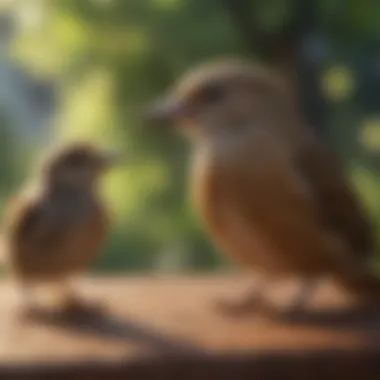
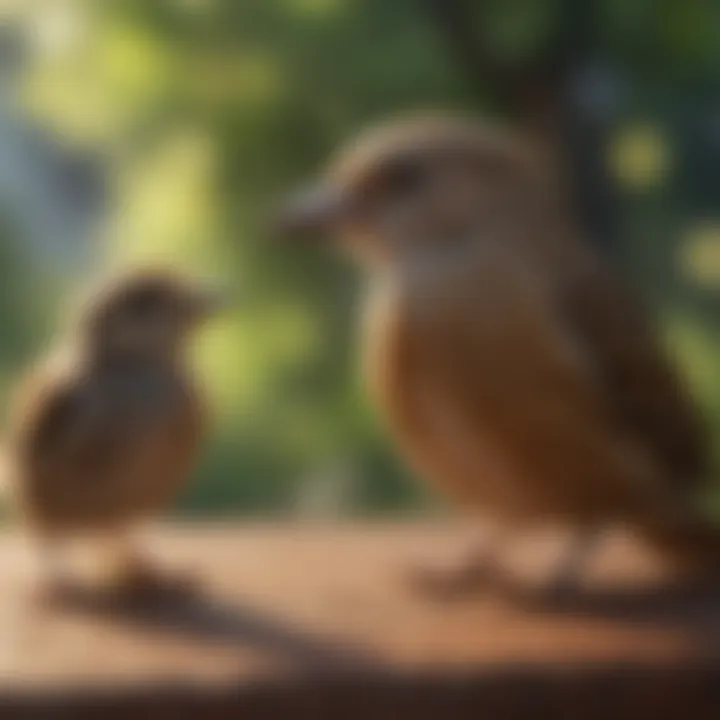
Having a firm understanding of behaviors like flapping, screaming, or preening can offer insights into how a bird is feeling in any situation:
- Flapping: For many birds, flapping might indicate excitement or that they simply want to stretch their wings. However, it can also be a sign of distress—so context matters.
- Screaming: This behavior can be attention-seeking, or it may indicate dissatisfaction. A sitter should know the difference and respond accordingly.
- Preening: Normal and healthy, preening is your bird's way to maintain feathers. If a bird suddenly stops preening, it could signal stress or health issues, something to keep an eye on.
For your sitter to engage successfully with your bird, share any specific quirks or behaviors they should be aware of. This groundwork in understanding a bird's behavior will help deepen the bond between your feathered companion and the sitter.
"Knowledge is the foundation of trust, not just for the owner but also for the caregiver."
In summary, having essential bird care knowledge is invaluable. When a bird sitter understands dietary needs and behavioral patterns, the bird is likely to feel more at ease, making the whole experience smoother for everyone involved. Education on these points empowers both owners and sitters, creating a safer environment for your beloved pet.
The Importance of Environment
When it comes to caring for birds, the environment in which they are housed is often overlooked. A carefully curated setting can mean the difference between a content bird and one that feels threatened or stressed. A good environment not only ensures the physical well-being of the birds but also contributes to their psychological health.
Creating a Safe Space
Creating a safe space for your feathered friend is no simple task. Birds, like any other pet, thrive in an environment where they feel secure. You should consider the following pointers when preparing a space for your bird sitter to care for your pet:
- Safe Housing: Ensure that cages are escape-proof and placed in a secure area, away from drafts and potential hazards.
- Familiarity: Keep some of your bird's favorite toys or perches in the room. This familiarity can help reduce anxiety during the babysitting period.
- Quiet Zones: If possible, designate an area that is relatively quiet, especially if the bird is sensitive to noise. Too much commotion can trigger stress, which is not what you want when you are trusting your bird to someone else's care.
A calm and inviting atmosphere is essential. Use soft lighting rather than harsh fluorescent bulbs, and ensure that the temperature is comfortable. A little attention to detail goes a long way in protecting your beloved pet.
Minimizing Stress for Birds
Stress can be a silent killer for birds, often leading to health issues if not addressed. Therefore, when a bird sitter comes into the picture, it’s crucial to minimize any potential stressors. Here are several ways to help accomplish that:
- Routine: Birds thrive on routine. Before you leave, try to establish a schedule with the sitter for feeding, playtime, and cage cleaning. Consistency helps in making your birds feel secure.
- Gradual Introduction: Introduce the sitter to your bird gradually. This can start with short visits where the sitter can simply sit near the cage. Let your bird get comfortable before moving to hands-on care.
- Calm Presence: Encourage the sitter to remain calm and gentle. Birds are very attuned to human emotions and can pick up on stress or anxiety, which only adds to their own.
"A bird’s environment plays a significant role in its emotional and physical wellbeing. Be mindful of its surroundings to promote a healthy and stress-free experience for both your pet and the caregiver."
The environment holds significant weight in ensuring that both the bird and its babysitter experience a smooth transition. By dedicating time to create a safe space and minimize stressors, you’re allowing use of peace to reign, which is ultimately beneficial for both parties.
Building a Trusting Relationship
Building a trusting relationship between your bird and a babysitter is fundamental to ensuring a positive experience for everyone involved. Birds can be sensitive and observant creatures, often picking up on the emotions and actions of those around them. If your bird feels comfortable with its caregiver, it is more likely to display positive behaviors and adapt well to this temporary arrangement. This relationship doesn't just happen by chance; it requires a thoughtful and intentional approach.
A core element of this relationship is communication. As the bird owner, you are the bridge between your pet and the sitter. Clear directions about your bird’s personality, habits, and needs go a long way. Not only does this help the sitter understand how to best care for your bird, but it also builds confidence in their abilities. An attentive sitter will appreciate your specific insights, as they can customize their approach, which fosters a smoother interaction.
Introducing Birds to Sitters
Before leaving, it’s critical to have a well-planned introduction between your bird and the sitter. This process should unfold gradually, much like opening a book slowly to absorb each chapter fully. You might consider setting aside some time when both the sitter and your bird are at their most relaxed. Choose a quiet space where your bird feels secure.
- Start Simple. Have the sitter sit quietly in the same room as your bird. Allow the bird to observe the sitter from a distance. This way, your pet can gauge any potential threats and decide when it feels safe to approach.
- Use Treats. Hand your sitter some of your bird’s favorite treats. Encouraging the sitter to gently offer treats can quickly turn suspicion into curiosity. When the bird associates this new person with something positive, it enhances their willingness to engage.
- Be Patient. Every bird has its timeline. Some may warm up quickly, while others may take their sweet time. Recognizing these differences and allowing space for your bird to adapt can ease the transition significantly.
Benefits of a Gentle Intro
- Relieves stress for your bird, lowering the risk of anxiety-related behaviors.
- Enhances trust between the bird and the sitter, resulting in a more enjoyable sitting experience.
"Patience is the companion of wisdom."
Birds, much like people, can take time to develop relationships. A measured approach is always best.
Monitoring Interactions
Once the introduction is done and your bird is interacting with the sitter, ongoing monitoring of their interaction is key. This oversight can take various forms, from initial oversight during your absence to regular check-ins if the babysitting extends over several days. Here are a few aspects to consider during this period:
- Stay in Touch. Using technology can help you stay connected with both the sitter and your bird. Video calls or shared updates can provide peace of mind and ensure that everything is going smoothly. Don't hesitate to ask the sitter for regular updates.
- Observe Behaviors. Look for signs of comfort or discomfort in your bird. Is it chirping contentedly or showing signs of stress, such as feather plucking or excessive squawking? These behaviors can be key indicators of how well the relationship is developing.
- Encourage Feedback. After the first day or two, check in with your sitter about what they’ve noticed. Their observations can provide valuable insight into your bird’s behavior and assist in fine-tuning the care plan if necessary.
By monitoring interactions closely, you can address any issues that arise proactively, which helps to foster a continually trusting relationship. Each observation lays the groundwork for smoother interactions in the future, creating a supportive environment for both the sitter and your feathered friend.
Setting Clear Expectations
Setting clear expectations is critical when finding a bird babysitter. Pet birds aren't like pet dogs or cats; they have unique needs and specific requirements that must be clearly communicated to their caregivers. A successful bird-sitting arrangement hinges on transparency, enabling a smooth experience for both the pet and the sitter.
By outlining your expectations, you create a foundation of trust. This helps the sitter understand what is anticipated of them, including what your bird likes or dislikes, its feeding schedule, and any particular behaviors to be aware of. Clarity can evolve into a significant factor that alleviates stress for both parties. A well-defined communication strategy can prevent misunderstandings, and ultimately ensure your bird's well-being during your absence.
Communication before Service
Effective communication prior to the bird-sitting service is paramount. This stage sets the tone for the entire experience. Arranging a face-to-face meeting or a detailed phone call can greatly benefit everyone involved. It allows you to present your bird’s unique personality and habits.
- Discuss Specific Needs: Each bird has its own quirks, from dietary restrictions to favorite activities. Providing this information upfront can help your sitter feel confident in their care. For instance, if your cockatiel prefers to sing at dawn, it’s important that they know what to expect.
- Address Concerns: If you have reservations about leaving your feathered friend with someone new, voicing those concerns can help clarify expectations. For example, if your parrot tends to get anxious around strangers, sharing this can prepare your sitter to approach more cautiously.
- Set Communication Methods: Make sure to agree on how often you want to be updated during the sitting period. Whether it’s through texts, photos, or phone calls, setting communication levels can ease worry.
Daily Routines and Care Instructions
Birds thrive on routine. When birds know what to expect, it reduces their stress levels and promotes better health. You should convey the daily routine to your sitter clearly. This includes feeding schedules, playtime, and other activities.
- Feeding Instructions: Detail what your bird eats, how much, and how often. Do they prefer fresh veggies in the morning or pellets at night? Be as precise as possible. You might say something like, "Feed Jasper his pellets at 8 am, fresh fruit at noon, and seeds before bed."
- Cage Maintenance: Relay how and when to clean the cage. Perhaps you keep a daily log or manual with instructions. It could include how often to change the water and check for any droppings that need clearing out.
- Play and Interaction: Explain how much playtime your bird typically enjoys and any favorite toys or activities. If your parrot loves spending half an hour with its favorite rattle every day, share those details. It ensures your sitter provides a supportive, enriching environment for your pet.
- Health Monitoring: Finally, ensure that your sitter knows how to spot any signs of distress or illness. For example, if your budgie starts acting lethargic or refuses food, inform your sitter on how to react.
Clear communication before service establishes a harmonious relationship and is vital in ensuring your feathered family member is cared for effectively.
Contracts and Payment Structures
When you’re looking for someone to take care of your feathered companion, having clear contracts and a well-structured payment plan is just as important as finding the right sitter. In the world of pet care, especially with birds, these elements can mean the difference between a smooth experience and a potential mess.
Creating an explicit contract provides many benefits including clarity and accountability. It sets expectations for both the sitter and the pet owner. This can include details like how often the birds will be fed, what kind of toys or interactions will be provided, and any specific health considerations. Without these details laid out, misunderstandings can arise, leading to unnecessary anxiety for both parties.
Understanding Service Agreements
A service agreement outlines the specific responsibilities agreed upon by both the bird sitter and the owner. For most pet owners, knowing that their bird’s needs are precisely understood and recorded gives peace of mind. Usually, it covers:
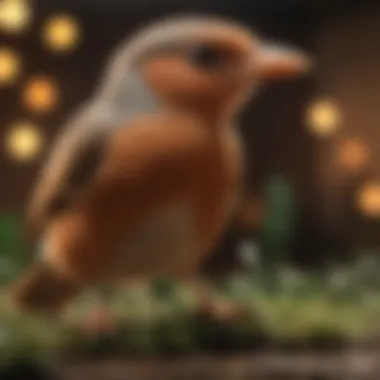

- Care Routine: How many times a day the bird will be interacted with or fed.
- Emergency Procedures: What steps will be taken if the bird shows signs of distress or health issues.
- Time Duration: How long the sitter will be responsible for each day or week.
When crafting a service agreement, make sure to consider whether the sitter has experience with your particular breed or species of bird. Bird care can significantly differ between species; for instance, the dietary needs of a parrot can be quite different from those of a finch. The contract should clearly identify any specific care instructions and must be personalized.
In today’s digital age, having an online agreement that both parties can sign is easy and efficient. This process helps in storing and retrieving the document if any questions arise later.
Negotiating Fees
Discussing fees can feel a bit awkward, but it’s crucial that both parties feel comfortable with the arrangements. Start by understanding the going rates for bird-sitting in your area. This can vary widely based on location, expertise of the sitter, and additional services provided, such as administering medication or grooming your bird.
Some pointers for negotiating fees include:
- Comparing Rates: Check what other bird sitters in your locality are charging. This helps to frame your negotiation.
- Value of Experience: If a pet sitter has extensive experience or specific qualifications, it may justify a higher rate.
- Payment Terms: You might want to discuss whether payments will be made hourly, per visit, or perhaps as a flat fee for the entire period of care.
Fees can be a sticking point, but remember it’s about value too. If someone charges a little more but has a great reputation or specialization, it might be worth considering. After all, when it comes to your pet's well-being, investing in quality care can be priceless.
Important: Always get the agreed fee and payment terms in writing to avoid any future frictions.
Ultimately, both a service agreement and a fair payment structure lead to a peace of mind that allows you to focus on other matters while knowing that your bird is in good hands.
Emergency Preparedness
When it comes to the well-being of your pet bird, being prepared for emergencies is not just good sense; it is vital. Emergency situations can arise unexpectedly, and having a solid plan can make all the difference for your feathered friend. The role of a bird babysitter expands beyond the standard caregiving; they also need to be equipped to respond effectively when things go awry.
An emergency preparedness plan can provide peace of mind for pet owners, knowing they have taken necessary precautions. Here are some key aspects to consider:
- Situational Awareness: The babysitter should be familiar with your home environment and know potential hazards. This could include sharp objects, toxic plants, or even other pets that might pose a risk.
- Communication: This is paramount. Ensure your babysitter knows how to contact you or your designated emergency contact quickly. A written list of important phone numbers is a good practice. It's a small detail, but it helps, especially when emotions run high during a crisis.
- Supplies Ready: Prepare an area with emergency supplies, such as first aid materials specifically for birds. This includes antiseptics, gauze, and a list of every bird’s dietary restrictions in case of accidental ingestion of harmful items. Have these supplies accessible, yet secure enough to avoid accidents.
The importance of preparing for emergencies cannot be overstated. Without a plan, a situation can quickly go from bad to worse. The right strategies and practices can cut down reaction time dramatically, potentially saving a bird's life.
Identifying Emergency Protocols
An essential component of the emergency preparedness plan lies in establishing clear protocols. The first step is to create a detailed document outlining what actions should be taken in various situations – be it sudden illness, accidents, or any other unforeseen events. Some protocols to consider include:
- Identifying Symptoms of Illness: Teach your babysitter how to recognize signs of distress in your bird, such as lethargy or changes in eating habits. Knowledge of the bird’s normal behavior can help pinpoint issues early on.
- Recommended Actions: Outline clear steps to take in various scenarios. For example, if a bird appears ill, guidelines regarding whether to seek immediate veterinary care or how to administer first aid can be invaluable.
- Instruct on Various Emergencies: Cover situations like a bird flying out of an open door or window—what they should do to safely retrieve the bird while minimizing stress.
Having these emergency protocols documented ensures that your bird sitter acts promptly and efficiently during crises, reducing the risk of confusion.
Access to Veterinary Care
Lastly, securing access to veterinary care is crucial in emergency preparedness. A comprehensive plan should include information about the nearest avian veterinarian, including address, phone number, and hours of operation. Here are some tips for ensuring veterinary access:
- Emergency Contact List: Provide your babysitter with a list of local vets along with a few specialists who handle birds. Equally important, add after-hours emergency vet clinics to this list. This can be handy when time is of the essence.
- Transportation Options: Instruct your babysitter on how to handle transportation for an emergency visit, whether it’s the available vehicle or rideshare options should driving be an issue.
- Insurance Information: If your bird is covered under a pet insurance policy, ensure your babysitter knows how to access that information easily, including policy numbers and contact details for the insurance provider.
Emergencies can create a lot of stress, not just for the pet but also for the people trying to help them. By preparing for these circumstances, pet owners can help mitigate some of that pressure and ensure their bird receives the care it needs, when it needs it.
"Preparation is the key to success. In the realm of pet care, it equates to survival in crisis situations."
Post-Sitting Considerations
When the time comes for your bird to return home after a stay with a babysitter, it’s essential to reflect on the entire experience. The post-sitting phase is not merely about bringing your feathered friend back to their familiar territory; it also involves some thoughtful reintegration and evaluation processes. Understanding the significance of this phase helps ensure that the transition back home is smooth and beneficial for both you and your bird.
Reintegrating Birds
Reintegration is more than just placing your bird back in its cage. It's critical to approach this with care. Birds are sensitive creatures, and they might experience stress when returning home after a caregiver takes care of them. Here’s what to keep in mind:
- Allow for Adjustment: Just as humans need time to settle back in, so do birds. Start by giving them a quiet space, free from loud noises or sudden movements.
- Monitor Behavior: After reintroducing your bird to their environment, watch for any signs of distress. It can range from excessive chirping to a sudden desire to hide.
- Gradual Return to Routine: Reestablish their usual schedule slowly. If they were accustomed to morning playtime, ease them back into that rather than diving headlong into a full routine.
- Engagement: Spend extra time with them to reinforce your bond. Many pets can feel temporarily abandoned post-sitting, so your presence is key to reassuring them.
By taking these steps, you don’t just help your bird settle back in; you also actively support their emotional well-being.
Feedback and Reflection
Once your bird is back to their old self, it’s a good time to reflect on the babysitting experience. Gathering feedback is crucial for several reasons:
- Assessing Care Quality: Reach out to your sitter and inquire about their experience. Ask them how your bird behaved, any peculiar habits they noticed, or if there was anything your bird enjoyed. Their insights can help guide future care arrangements.
- Documenting Observations: Keep a record of what went well during the sitting period and what could be improved. This will not only help you assess the babysitter but ensure you keep track of what works best for your pet.
- Building Trust: Sharing experiences can strengthen the relationship between you and the babysitter. If the feedback is positive, don’t hesitate to enlist their services again. Building rapport can lead to better care in future sitting periods.
Reflecting on the process can also lead you to discover new needs or preferences your bird might have developed.
Remember, each bird is unique—what works for one might not suit another. Always prioritize their comfort and emotional health during transitions.
Fostering a dialogue between your bird’s experience and yours ensures that you can adapt and make informed decisions moving forward. Whether you consider hiring the same babysitter or exploring new options, being diligent about feedback ultimately leads to happy, well-cared-for pets.
Epilogue
Choosing the right care for your bird is not just about finding someone to sit with them while you're away. It's an intricate process that requires careful thought and consideration. Pet birds, similar to other pets, possess unique needs that a babysitter must understand and cater to. Overlooking these elements can lead to stress for both your bird and the caregiver.
Choosing the Right Care for Your Bird
When you’re looking for a suitable babysitter for your feathered friend, several factors come into play. It's essential to prioritize trustworthiness, as you’ll be putting your bird's well-being in another's hands. Ask for referrals from fellow bird enthusiasts or local pet shops where staff often have insight into potential sitters’ backgrounds.
Also, consider the sitter's experience with birds specifically. Not all pet sitters are equipped for the nuances of avian care. For example, knowledge about diet is crucial, particularly if your bird has specific dietary preferences or requires fresh food daily.
Potential caregivers should be familiar with your bird's species because certain birds have distinct behavioral traits that can influence how they react to being cared for by someone new.
During the interview phase, don't hold back on questions. Find out:
- What their background in bird care looks like. Have they owned birds? Have they studied avian behavior?
- How they handle different bird temperaments. Some birds can be quite shy or territorial.
- Their understanding of emergencies related to birds. Are they prepared to manage a situation should health issues arise?
Taking the time to find the right fit is beneficial in the long run. Not only will it alleviate your worries while traveling, but it will also lessen the anxiety your bird may feel in your absence. Ultimately, a strong bond between your bird and the sitter can foster a sense of security, making all the difference in their overall well-being.
In summary, each step of the babysitting journey requires attention. Start with a good foundation by seeking out suitable candidates, and keep communication crystal clear.
"The foundation of trust and communication with a bird sitter can lead to a secure environment for your bird, which is priceless when you're away." For further insights, consider engaging with communities online, such as on Reddit.
Finding the right caregiver involves balancing personal comfort, your bird's needs, and ensuring that the sitter can deliver exceptional care. With diligence and foresight, you can ensure a stress-free experience for all parties involved.







